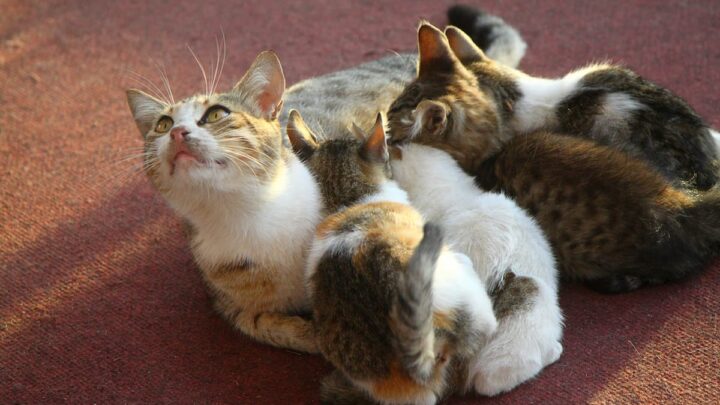Read this Is It Normal For A Cat To Have One Kitten article to find useful information for you, all summarized well by us.

Is It Normal for a Cat to Have One Kitten?
As an avid cat enthusiast, I have always been fascinated by the remarkable reproductive capabilities of these feline companions. It’s not uncommon to witness litter sizes ranging from two to eight or even more kittens. However, one question that often sparks curiosity is the possibility of a cat giving birth to only a single kitten.
While it may seem unusual, it’s important to understand that single-kitten litters do occur, and they are not necessarily a cause for concern. In this comprehensive guide, we will delve into the fascinating world of cat reproduction, exploring the various factors that can influence litter size and shedding light on the unique circumstances surrounding single-kitten pregnancies.
Single-Kitten Litters: An Overview
Statistically speaking, single-kitten pregnancies account for a relatively small percentage of all cat litters. The average litter size for domestic cats ranges from two to four kittens, with variations depending on breed, age, and overall health of the mother cat.
When a cat gives birth to only one kitten, it is referred to as a “singleton” litter. Singleton litters can be the result of several factors, including:
- First-time pregnancies: Cats that are giving birth for the first time tend to have smaller litters, and it’s not uncommon for them to have only one or two kittens.
- Age: As cats age, their fertility declines, and they may produce smaller litters or have difficulty conceiving altogether.
- Health conditions: Certain health conditions, such as uterine abnormalities or hormonal imbalances, can affect a cat’s ability to produce multiple embryos or carry them to term.
- Genetics: Some cat breeds may be more prone to having single-kitten litters than others.
The Significance of Singleton Litters
While singleton litters are not as common as larger litters, they are not necessarily abnormal. Single kittens can be just as healthy and thriving as kittens from larger litters, and they typically receive ample care and attention from their mothers.
However, there are a few considerations to keep in mind when caring for a singleton kitten:
- Socialization: Since singleton kittens don’t have littermates to interact with, it’s important to provide them with plenty of opportunities for socialization. This can be achieved through supervised playtime with other cats, toys, and human interaction.
- Nutrition: Singleton kittens may need more frequent feedings than kittens from larger litters. This is because they have fewer littermates to compete with for resources.
- Health monitoring: Singleton kittens should be regularly examined by a veterinarian to ensure they are growing and developing properly.
Tips for Caring for a Singleton Kitten
Caring for a singleton kitten is similar to caring for kittens from larger litters, with a few additional considerations:
- Provide plenty of socialization opportunities: Expose the kitten to other animals, toys, and people to help them develop social skills.
- Offer frequent feedings: Feed the kitten small meals several times a day to ensure they are getting adequate nutrition.
- Keep the kitten warm: Singleton kittens may be more susceptible to cold, so provide them with a warm and cozy environment.
- Monitor the kitten’s health: Regularly check the kitten’s weight, appetite, and overall behavior. Contact a veterinarian if you notice any signs of illness.
Frequently Asked Questions about Single-Kitten Litters
- Q: Is it common for a cat to have only one kitten?
A: While not as common as larger litters, single-kitten pregnancies do occur and are not necessarily a cause for concern.
- Q: Why might a cat have a single-kitten litter?
A: Single-kitten litters can result from various factors, including first-time pregnancies, age, health conditions, and genetics.
- Q: Are singleton kittens healthy?
A: Yes, singleton kittens can be just as healthy as kittens from larger litters with proper care and monitoring.
- Q: Do singleton kittens need special care?
A: While singleton kittens don’t require drastically different care, it’s important to provide them with additional socialization opportunities and ensure they are getting adequate nutrition.
Conclusion
The world of cat reproduction is a complex and fascinating one. While single-kitten litters may not be as common as larger litters, they are not abnormal and can result in healthy and thriving kittens. By understanding the factors that can influence litter size and providing proper care for singleton kittens, cat owners can ensure the well-being of their feline companions.
If you are considering bringing a singleton kitten into your home, remember to provide them with plenty of love, attention, and socialization. With proper care, your singleton kitten can live a long and happy life.
Are you interested in learning more about cat reproduction or caring for singleton kittens? Share your thoughts and questions in the comments below.

Image: faqcats.com
We express our gratitude for your visit to our site and for reading Is It Normal For A Cat To Have One Kitten. We hope this article is beneficial for you.